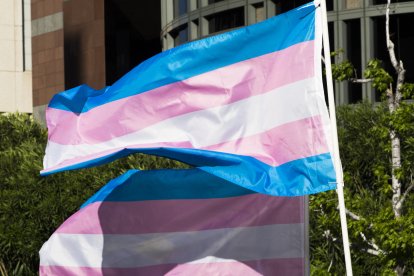New Zealand government sees 'insufficient evidence' to support use of puberty blockers
A government report issues new recommendations for health professionals, calling for a reduction in the use of hormone treatments for minors with gender dysphoria.

File image of a trans movement banner.
This week, New Zealand's Ministry of Health presented a report calling into question the use of puberty blockers. The government report recommends a more prudent use when prescribing these drugs.
The report claims that the current use of puberty blockers has weak scientific backing in terms of their efficacy and safe use.
While not banning their use, as the United Kingdom did this year, medical institutions will receive new recommendations to reduce the prescribing of the drugs listed in the ministry's report.
In New Zealand, puberty blockers can be prescribed to slow natural developmental physical changes in young people with gender dysphoria. Proponents argue this provides time to explore gender identity and potentially improve mental well-being.
In contrast, opponents argue that the effects of puberty blockers on the human body are harmful and that the benefits claimed by advocates have not been proven.
In Europe, a number of countries stopped using them after the latest reports and research highlighted their harmful effects and the lack of scientific evidence supporting their use. Leading this shift were the Nordic countries, which had previously been at the forefront of using hormones to treat gender dysphoria.
Lack of evidence
"These tighter controls reflect a level of concern both here and abroad about the increasing use of these drugs for treatment of gender identity problems without sufficient evidence to support their safety and efficacy both now and in the long term," stated New Zealand authorities.
According to New Zealand government data obtained by the Epoch Times, about 25 children aged 11 to 17 sought puberty blockers in 2010. By 2021, that number had risen to 140, and stood at 113 in 2023.
To compile its report, the Ministry of Health reviewed 4,000 international studies on the use of puberty blockers. One of the main findings was that patients who had taken puberty blockers had lower-than-expected bone density compared to other young people at the same stage of development.
Another serious concern was the lack of evidence that the medication, known as GnRH analogs, had any significant effects on kidney or liver function, or on fertility.
RECOMMENDATION






















